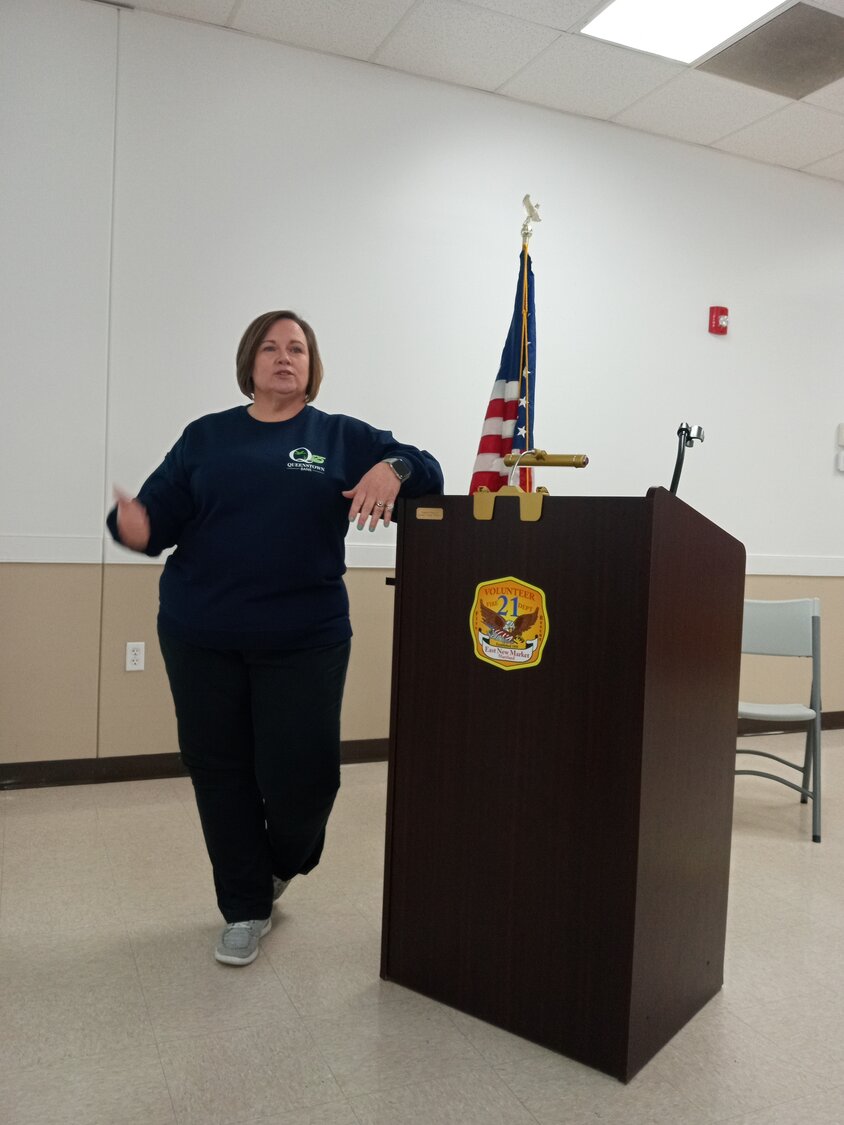Agribusiness Guru Dick Willey talks grain trends at Queenstown Bank Farmers Luncheon
Bank alerts farmers to check fraud danger
The basics of producing corn, soybean, and wheat crops aren’t rocket science to local growers. It’s a way of life, day in and day out, sunup to sundown, year after year.

You must be a member to read this story.
Join our family of readers for as little as $5 per month and support local, unbiased journalism.
Already a member? Log in to continue. Otherwise, follow the link below to join.
Please log in to continue |
Agribusiness Guru Dick Willey talks grain trends at Queenstown Bank Farmers Luncheon
Bank alerts farmers to check fraud danger
CAMBRIDGE - The basics of producing corn, soybean, and wheat crops aren’t rocket science to local growers. It’s a way of life, day in and day out, sunup to sundown, year after year.
But throw in the impact of market hiccups in the U.S., Brazil, or Argentina, plus extreme weather events suddenly upending markets, and the challenges grow exponentially.
For former Perdue Agribusiness head Dick Willey, steering through those undulating farm related tides and eddies have been his life’s work.
“When I look back now, it’s going on fifty years,” Willey said.
For thirty of those years, he oversaw that enterprise as it grew into a global field leader.
Though retired from that position since 2020, Willey’s second-to-none-scope of scope of agribusiness economics remains highly respected and sought after, consulting companies as far away as Argentina.
On Friday, March 8, local farmers traveled from across the Shore to hear his take on projections regarding the ever-fluctuating values of corn, soybeans, wheat, and more.
Queenstown Bank, which recently opened a branch in Cambridge, hosted the Second Annual Farmer’s Luncheon at the East New Market Volunteer Firehouse on Route 16 North.
Along with heaping helpings of clearly graphed data to digest, growers enjoyed a buffet lunch supplied by Hooper’s Island eatery Old Salty’s.
Tracy Whitby-Fairall, Queenstown Bank Vice President and COO, welcomed those gathered to hear Willey’s industry insights into the coming growing season.
She explained that “this is not a sales event,” for Queenstown, which has branches in “all of your back yards,” Queen Anne’s, Talbot, Caroline, and now Dorchester Counties.
“We want you to know that we are farm friendly and appreciate everything you,” she said.
She then offered a short public service announcement of benefit to the community.
“This will be my only banking spiel, but it’s important,” she said, then offered warnings to be vigilant against the check fraud, characterizing it as “rampant,” urging all to check their accounts daily.
To emphasize the scope of the problem, Whitby-Fairall shared her recent experience upon returning to work after a week’s vacation in Sarasota watching the Orioles.
“We probably had ten cases of check fraud just while I was gone,” she said. “You write a check to Mr. Chemical Guy. But what happens is that the check gets intercepted, then Mr. Chemical Guy’s name gets washed off the check and replaced with another.
"That person then takes it to a newly opened account of theirs at another bank, deposits it, and the check clears. Your check number and amount might look the same, but not the name of the person you wrote it out to,” she said.
Because farmers often write checks in large amounts, they’re especially vulnerable targets. And that’s another reason to check your accounts daily, she said.
Asked how the checks are intercepted, Whitby-Fairall explained that many were stolen through the mail.
“I encourage you not to use the blue mailboxes on the street anymore,” she said. “I know that not everyone is a mobile banking person, but with online banking you can get instant alerts, and it helps,” she said.
“One thing we’re doing as a bank to get out in front of the problem is having all branch managers do a large item check on anything that clears over $5,000. We’re looking at those every day,” she said.
As Willey began his gran market update, he mentioned having to postpone his scheduled appearance at last year’s event due to a medical condition.
“I really wish I could have been here last year, because the market news was better than,” he said.
According to the USDA’s January 2024 figures, farmers are building stocks of corn, creating an overabundance driving prices lower.
“By and large, farmers have stopped selling with these lower prices,” Willey said.
Additional graphs showed how the once dominant U.S. corn exporting leadership position has changed in recent years.
“Ethanol came, and Brazil came,” Willey said, noting that Brazil can produce two crops per year.
So far, though, the 2024 figures show the U.S. again slightly ahead of Brazil.
Another USDA graph showed how after devastating 2009-2010 years, when mass selloffs resulted, a better period occurred from 2014 to about 2019. At that time, the trading price range “bouncing in between” $3.00 to $4.65, offering both sellers and buyers a more comfortable risk management margin.
After 2020, the numbers dipped into bearish market levels, retreating briefly last year. Unfortunately, the outlook for trading prices is trending higher for the next few years, with a projected range from $4.00 to $5.65.
“I know that’s not what you want to hear,” Willey said.
Turning to soybeans, the crop used for meal and oil has become the “biggest story of my lifetime,” Willey said. He pointed to the growing demand for renewable diesel oil, which often uses soybean oil, particularly since California’s LCFS (Lower Carbon Fuel Standard) took effect this year.
Willey also discussed other facets of biodiesel and renewable diesel fuels and their oil-based components, including used cooking oil, most of which is exported by China.
For the historically staple crop of wheat, the numbers don’t tell a good story at all, now or in the near future, Willey said.
Compared to 2001, when 63 billion acres were planted, this year’s acreage amounted to just forty-nine billion.
“So many Mid-Atlantic mills have closed, along with others around the country,” he said.
Turning to the impact of weather, Willey found some good news on this year’s drought monitor map, showing relief for Southern and Eastern states. But in looking at the sharp uptick in the number of weather-related disasters, he stressed that extreme weather is, in fact, becoming the norm, with no letup in sight.
“Don’t be a climate denier,” he said. “It’s dramatic and its real.”


 By
By 



